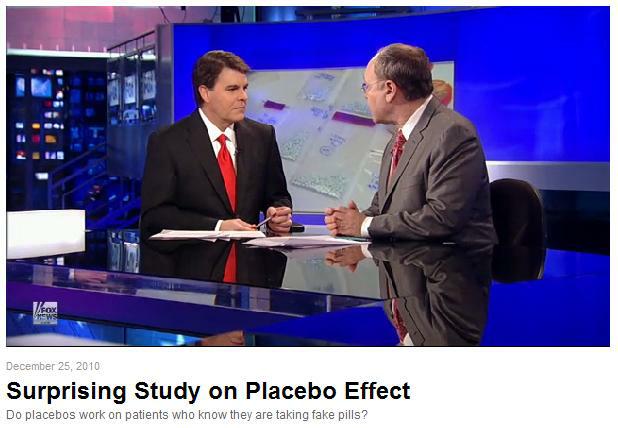Australia’s Sun-Herald newspaper referred to us in a general article on the placebo effect. Placebos: the future of medicine?
We also made it into Body & Soul magazine (in an article that looks quite similar).
Australia’s Sun-Herald newspaper referred to us in a general article on the placebo effect. Placebos: the future of medicine?
We also made it into Body & Soul magazine (in an article that looks quite similar).
America’s 60 Minutes on ‘Depression and the Placebo Effect’
 You know you’ve made it when they run a story on Fox News. Forget Harvard (where the groundbreaking placebo study took place that allowed patients to KNOW they were trialling placebos). The Harvard study told participants the ‘medication’ they were taking was inert, however it ‘would engage the mind-body and self healing thing’.
You know you’ve made it when they run a story on Fox News. Forget Harvard (where the groundbreaking placebo study took place that allowed patients to KNOW they were trialling placebos). The Harvard study told participants the ‘medication’ they were taking was inert, however it ‘would engage the mind-body and self healing thing’.
Marc Siegel, from something called the ‘Fox News Medical A-Team’, comments on video here.
In other news, the more mainstream Wall Street Journal comments on the research here and here.
We were fascinated to see a story on Australia’s ABC News about recent research into the placebo effect. Pain researcher Damien Finniss, from Sydney’s Royal North Shore Pain Management and Research Institute, has published a paper in The Lancet on the phenomenon of the placebo effect. The ABC story makes two points which in our view have not received sufficient attention, namely:
* that the placebo effect is engaged even when a patient is aware s/he is receiving placebo (the ‘no-blind test’); and
* that responsible practitioners consider the agency of placebo in the course of treatment.

Consistent with other researchers we’ve read, Finniss and his colleagues are concerned with ethical issues in practitioner-client relationships in consideration of conscious engagement with the placebo effect. This is what we’d expect from responsible researchers and health professional. At the same time, we’re aware of anecdotal evidence and some research (contained elsewhere in this blog) that in any case there is widespread ‘de facto’ use of placebos in general practice and elsewhere, as for example in the presciption of an antiobiotic in the treatment of a viral condition.
It sounds counter-intuitive, but it seems that placebos are geting ‘stronger’ … or more to the point, the placebo effect is increasingly recognised as touching the heart of the overall process of healing and the nature of wellness. A fascinating article on this dynamic phenomenon in Wired magazine – looks like the debate is going mainstream!
And lest we forget … there’s money at stake. Big money.
What a difference a mention in the NY Times makes! There’s been an incredible amount of web traffic generated by a website advertising ‘Obecalp‘ (‘placebo backwards), including a very lively debate at one of our favourite sites, Boingboing
In the Boingboing exchanges, most people are objecting to (a) enculturating kids into pill-popping behaviours, and (b) deceiving kids about the actual nature of the pill. Nobody’s gainsaying the operation of the so-called placebo effect, it seems to be more about the parenting issues …
I guess the same objections would be raised to behaviour like putting a Flintstones-themed band-aid on a bumped knee that didn’t actually need a band-aid, with the assurance that this would ‘make it better’…?
Two things, in defence of the placebo-as-pill approach (and astute readers will be aware that the placebo effect can also be engaged through sham injections, sham surgery … and possibly Mystical Words Uttered Backwards Under a Full Moon and so forth …
As conscious purveyors of placebos, we’re concerned with the potential of the placebo effect to inspire self-healing. We don’t recommend that people lie about or misrepresent our product: it’s a sugar pill, inert, side-effect free … BUT the placebo effect exists, and there is some evidence to show that people ingesting a placebo *in the awareness that it’s a placebo* may still gain some benefit. That’s the ‘honesty in parenting’ bit.
As to the pill-popping-culture bit, well … perhaps. One of our team is a homeopath, and consequently aware of the materialist critique that homeopathic remedies are also nothing else but placebos. In general, our feeling is ‘so what? If there’s no deception and misrepresentation, and the things actually work, what’s the harm?’
We understand the passion and the aggro, to an extent. Nobody likes the idea of ripping people off and leveraging the pain of children. But we can assure you there’s a case to be made for harmless and light-hearted exploration of the placebo effect, and especially for the questions it raises about the same pill-popping culture that encourages conventional practitioners to regularly use ineffective treatments (such as prescribing antibiotics for viral infections).
One for those who can’t start the day without a caffeine hit. 😉